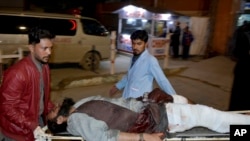ເຈົ້າໜ້າທີ່ໃນພາກຕາເວັນຕົກສຽງໃຕ້ປາກິສຖານ ກ່າວວ່າ ລະເບີດຂະໜາດແຮງ ໄດ້ແຕກຂຶ້ນຢູ່ວັດອິສລາມແຫ່ງນຶ່ງ ໃນລະຫວ່າງການສູດມົນພາວະນາໃນວັນສຸກວານນີ້ ເຮັດໃຫ້ພວກທີ່ຢູ່ໃນວັດຢ່າງໜ້ອຍ 15 ເສຍຊີວິດແລະອີກ 20 ກວ່າຄົນໄດ້ຮັບບາດເຈັບ.
ເຈົ້າໜ້າທີີ່ຕຳຫຼວດອະວຸໂສທ່ານນຶ່ງ ແມ່ນຮວມຢູ່ໃນພາກທີ່ເສຍຊີວິດ ໃນການວາງລະເບີດຢູ່ເມືອງແກັດຕາ ເມືອງເອກຂອງແຂວງບາລູຈິສຕານທີ່ມີຊາຍແດນຕິດກັບອີຣ່ານແລະອັຟການິສຖານ.
ນາຍຕຳຫຼວດອະວຸໂສໃນແຂວງດັ່ງກ່າວ ທ່ານອັບດູລ ຣັສຊັກ ຊີມາ ກ່າວຕໍ່ພວກນັກຂ່າວວ່າ ຜູ້ເຄາະຮ້າຍສ່ວນໃຫຍ່ແມ່ນພົນລະເຮືອນ. ການສືບສວນກ່ຽວກັບການໂຈມຕີຮ້າຍແຮງນີ້ ກຳລັງມີຂຶ້ນ ແຕ່ຍັງບໍ່ທັນເປັນທີ່ຮູ້ກັນເທື່ອໃນເວລານີ້ເຈົ້າໜ້າທີ່ ທີ່ເສຍຊີວິດໄປນັ້ນ ແມ່ນເປົ້າໝາຍໃນການໂຈມຕີຫຼືບໍ່.
ພວກທ່ານໝໍກ່າວວ່າ ຜູ້ເສຍຊີວິດອາດມີຈຳນວນເພີ້ມຂຶ້ນຕື່ມ ຍ້ອນວ່າພວກທີ່ໄດ້ຮັບບາດເຈັບບາງຄົນ ທີ່ຖືກສົ່ງໄປໂຮງໝໍເມືອງແກັດຕານັ້ນ ແມ່ນມີອາການສາຫັດ.
ກຸ່ມກໍ່ການຮ້າຍລັດອິສລາມໄດ້ອ້າງເອົາຄວາມຮັບຜິດຊອບ ໃນການໂຈມຕີເມື່ອວັນສຸກ ວານນີ້ ໂດຍກ່າວວ່າ ເປັນນ້ຳມືຂອງພວກໂຈມຕີສະຫຼະຊີບ. ກຸ່ມລັດອິສລາມອ້າງວ່າ ມີຜູ້ບາດເຈັບລົ້ມຕາຍ 60 ຄົນ ຮວມທັງຜູ້ເສຍຊີວິດ 20 ຄົນ ອີງຕາມກຸ່ມສືບລັບໄຊທ໌ ທີ່ໄດ້ອອກຄຳເຕືອນ ແລະແປຄຳຂົ່ມຂູ່ຂອງພວກຈີຮາດ.
Authorities in southwestern Pakistan say a powerful bomb blast ripped through a packed mosque during Friday evening prayers, killing at least 15 worshipers and injuring around 20 others.
A senior police official was among those killed in the bombing in Quetta, the capital of Baluchistan province bordering Iran and Afghanistan.
A senior provincial police official, Abdul Razzaq Cheema, told reporters most of the victims were civilians. An investigation into the deadly attack was underway but it was not immediately known whether the slain officer was the target, Cheema added.
Doctors said the death toll could rise because some of the wounded were brought to Quetta hospitals in “critical condition.”
The Islamic State terror group claimed responsibility for Friday's attack, saying it was carried out by a suicide bomber. IS claimed the blast caused 60 casualties, including 20 dead, according to the SITE Intelligence Group, which provides alerts and translations of jihadist threats.
On Tuesday, a bomb went off near a security personnel vehicle in Quetta, killing at least two people and injuring 14 others. The explosives were planted in a motorcycle parked on a main road in the city. Hizbul Ahrar, a breakaway faction of the outlawed Pakistani Taliban, took credit for that attack.
Baluchistan, Pakistan’s largest but sparsely populated province, is rich in mineral resources and has routinely experienced militant violence.
The province is home to a separatist Baluch insurgency and it allegedly also shelters Afghan Taliban leaders and fighters in areas hosting hundreds of thousands of Afghan refugees.
Pakistani security officials, however, say sustained counter-militancy operations have significantly improved the law and order situation in Baluchistan in recent years.
The province is at the center of major infrastructure, transportation and power generation projects being built under the multi-billion-dollar China-Pakistan Economic Corridor (CPEC) collaboration, a flagship of Beijing’s Belt and Road Initiative.






